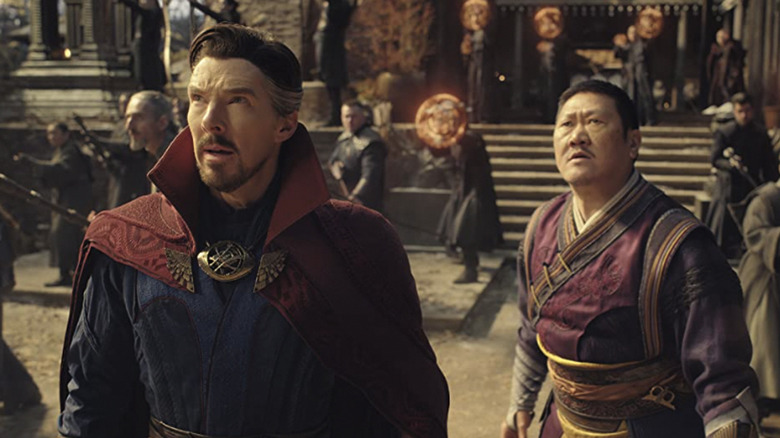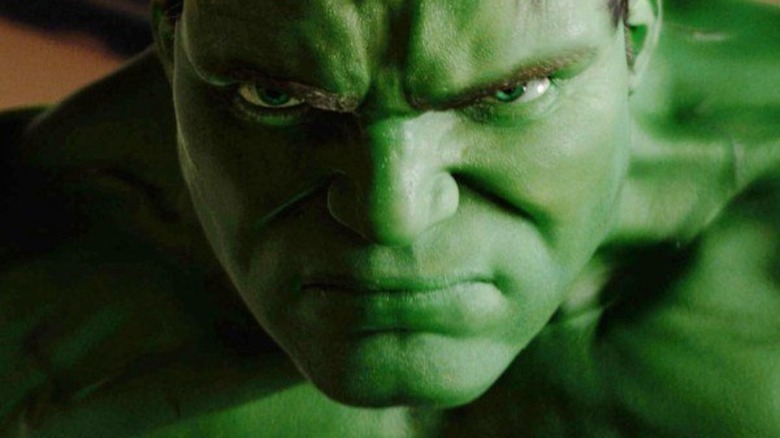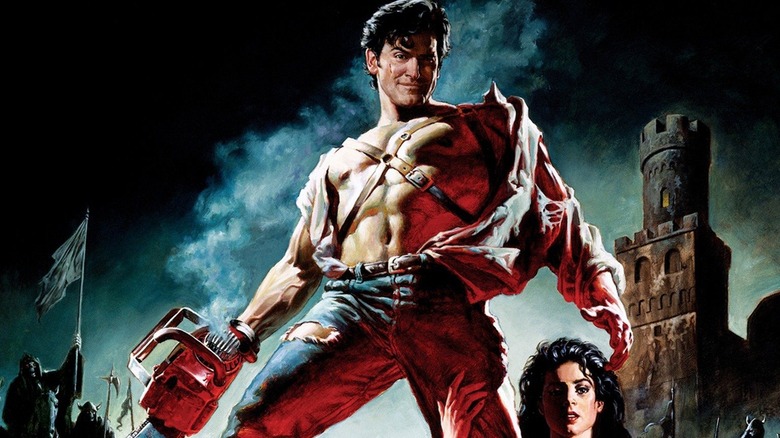Doctor Strange In The Multiverse Of Madness Has The Best Danny Elfman Score In Years
Danny Elfman's music career began when he was only 19. It was 1972, and Richard Elfman, Danny's older brother, founded a surrealist — and mighty raunchy — burlesque troupe called The Mystic Knights of the Oingo Boingo. The troupe would tour L.A.'s underground theater scene for years, and Danny would eventually take leadership of the group, pushing them in a more musical direction. By 1976, The Mystic Knights were performing standards from the '30s and '40s. Sadly, as they performed live in public spaces, there are no recordings of the Mystic Knights in their early days, save for one cameo appearance they made in the background of Martin Brest's 1976 film "Hot Tomorrows," and a notable appearance on "The Gong Show." Buddy Hackett, Shari Lewis, and Bill Bixby gave them a score of 24 out of 30.
In 1979, Danny and Richard bifurcated the troupe. Richard, using a lot of its members, would direct the masterfully crass cult film "Forbidden Zone" (in which Danny has a small role as the Devil), while Danny would form the band Oingo Boingo with another Mystic Knight, Steve Bartek. Oingo Boingo caused a major splash in the Los Angeles New Wave scene (they appeared in the concert film "Urgh! A Music War") and would go on to have major hits in "Ain't This the Life," "Private Life," "Just Another Day," "Only a Lad," and the Halloween standard "Dead Man's Party." Oingo Boingo would also perform the title song for the 1985 film "Weird Science," and performed on camera in "Back to School" the following year.
Throughout Boingo's success, Danny Elfman was also trying his hand at film scores. In 1985, director Tim Burton and actor Paul Reubens — both big Boingo fans — hired Elfman to compose the score for a feature film based on Reubens' character Pee Wee Herman. "Pee Wee's Big Adventure" featured Elfman's first film score, and established a relationship with Burton that would prove beneficial to both. Elfman's sound became synonymous with Burton's visuals, and Elfman has composed the music for all of Burton's feature films except for "Ed Wood." Elfman would also do a lot of excellent work for director Gus Van Sant, and his work on "Milk" and "Good Will Hunting" earned Elfman Oscar nominations (he received two other noms besides, for "Big Fish" and "Men in Black"). "To Die For" (1995) might be his best score.
In addition to two of the best TV themes ever written ("The Simpsons" and "Tales from the Crypt"), Elfman also became associated with superhero movies thanks to his work on Burton's 1989 film "Batman." He would go on to write the music for "Dick Tracy," "Darkman," "Batman Returns," "Spider-Man," "Hulk," "Spider-Man 2," "Hellboy II: The Golden Army," "Avengers: Age of Ultron," "Justice League," and now "Doctor Strange in the Multiverse of Madness."
When Danny Elfman diversified
As an artist, Danny Elfman seems to have insisted on evolving. In a notorious interview with the Huffington Post in 2015, Elfman was asked about his time with Oingo Boingo (the band split up in 1995), and he was eager to move on, calling his work as a rock star "embarrassing." Elfman has always looked forward as a musician, eager to try new things rather than stay settled in the things he was good at.
Throughout the 1980s and '90s, one could often pinpoint the "Elfman sound." A lot of eerie children's choral effects were a trademark, as were eerie, Stravinsky-inspired music box motifs. His scores were scary and hummable and excellent. While occasionally he would crack out a rock 'n' roll track ("Midnight Run," "Hot to Trot"), Elfman was generally hired to provide an Elfman score. No one else could have made something like, say, "The Nightmare Before Christmas." But something happened to Elfman in 2003: Ang Lee convinced him to change.
On the DVD special features for the 2003 superhero film "Hulk," Elfman talks about how his film-related creative process was refreshingly challenged by Lee. Elfman only wanted to work on "Hulk" because of Lee's involvement, and Lee only wanted Elfman if was going to expand his sound. Lee would listen to what Elfman was working on, and point out that it was "too Danny Elfman." This let the composer stretch and try new things orchestrally, forcing him to skew away from a lot of his usual trademarks. The score for "Hulk" still has a few recognizable Elfman elements (Elfmelements?), but does feel like a new animal. "Hulk" was the turning point in Elfman's sound.
In the ensuing 20 years, Elfman's old sound has fallen by the wayside, and he has proven himself capable of providing any kind of score to any kind of movie. In "Standard Operating Procedure," he sounds like Philip Glass. In "Avengers: Age of Ultron," he sounds like Michael Giacchino. In "The End of the Tour," he sounds like R.E.M. In "Fifty Shades of Grey" he sounds like ... well something new. And while one cannot dictate to an artist what they should and shouldn't do with their work, many fans — myself included — were generally disappointed that Elfman had given up the kookier sounds he pioneered early in his career. Old Danny Elfman was gone, only to return with his occasional collaborations with Tim Burton or with Sam Raimi.
Elfman and Raimi
Danny Elfman first worked with Sam Raimi on the 1990 film "Darkman," which was one of the many pulp hero films to come in the wake of the success of "Batman." Elfman also worked on "Army of Darkness," the energetic and bizarre third feature in the director's "Evil Dead" series. While Joseph Lo Duca composed most of the "Army" score, Elfman provided the film's "March of the Dead" piece. Following that, Elfman and Raimi would re-team for "A Simple Plan," "Spider-Man," "Spider-Man 2," and "Oz the Great and Powerful."
Their most recent collaboration is the brand new "Doctor Strange in the Multiverse of Madness," and, wouldn't you know it, it's a return to the '90s Elfman sound. "Multiverse," while ultimately being a cog in the ever-expanding MCU machine, is also a spooky haunted-house style picture with several Raimi-like visual quirks and horror elements that let it stand out for a few, fleeting, desperate moments. Most notable of those Raimi quirks is the full-bore spooktastic score by Danny Elfman, once again returning to his eerie children, organs, and strings extruded from the abdomens of spiders. It's classic Danny Elfman without qualification. Oh, what a great thing.
As an aging critic who was raised on Elfman's early-career signatures, hearing it again was comforting and exhilarating. Finally, "Multiverse" sounded the way a film ought to sound: With noticeable themes, intrusive aural moments, a sound all its own. Some film composers prefer to "stay out of the way," using their music merely to compliment or more deeply saturate the film's visuals. Other composers like to be heard, their music foregrounding the visual action. Elfman previously worked in the milieu of the latter, and then, after "Hulk," was proud to work his way more into the ethos of the former.
There is, of course, integrity in both approaches, and, again, Elfman is permitted to do whatever the heck he wants creatively. Only fans of his early work have complained that Danny Elfman kind of receded from his rightful place as a "quirky" musician. Elfman, however is 68 years old, has several Oscar nominations, a 20-year career as a New Wave rocker, and recently put out a record, "Big Mess," as recently as 2021. His exploration is a fine thing to encourage.
But when he provides what he's best at — when he makes you afraid and amused at the same time using nothing but a bassoon and a clever chord progression — it's a glorious thing to hear.


